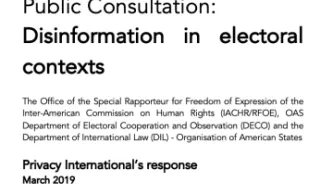Search
Content type: Examples
A man from Middletown, Ohio, was indicted in January 2017 for aggravated arson and insurance fraud for allegedly setting fire to his home in September 2016. Ohio authorities decided and succeeded to obtain a search warrant for the data recorded on the pacemaker after identifying inconsistencies in the suspect’s account of facts. Ohio authorities alleged that the data showed that the accused was awake when he claimed to be sleeping. It has been reported that a cardiologist, examining data from…
Content type: Long Read
Image courtesy of Michael Coghlan
The long-speculated Facebook cryptocurrency is finally here! Libra!
Libra Association, an entity co-founded by Facebook, has announced the creation of a new cryptocurrency, Libra, "a simple global currency and financial infrastructure that empowers billions of people".
The white paper that outlines the rationale for the new currency makes a number of heady statements, some which anyone who cares about rights should commend -- and some which should…
Content type: Advocacy
Privacy International has today sent letters to leading social media platforms to ask what they're doing to protect their users' from dangerous surveillance by government immigration authorities.
The letter comes following the implementation of plans by US authorities to require nearly all visa applicants to hand over identifiers of all social media accounts they have used in the previous five years, or face “serious immigration consequences”.
The move not only represents…
Content type: News & Analysis
US Immigration and Customs Enforcement (ICE), the agency at the centre of carrying out President Trump’s “zero tolerance” approach to immigration enforcement and family separation, has for years been contracting a US surveillance company to intercept peoples’ communications across the United States. The wide potential scope for the use of the powers raises concerns about their use for the real-time surveillance of people, families, and communities caught up in Trump’s immigration crackdown…
Content type: Examples
In yet another murder case, a New Hampshire judge ordered Amazon to turn over two days of Amazon Echo recordings in a double murder case in November 2018.
Prosecutors believe that recordings from an Amazon Echo in the Farmington home where two women were murdered in January 2017 may yield further clues as to who their killer might be. Though the Echo was seized when police secured the crime scene, the recordings are stored on Amazon servers.
Timothy Verrill, of Dover, New Hampshire, was…
Content type: Examples
In 2015, James Bates (of Arkansas, United States) was charged with first-degree murder in the death of Victor Collins. Collins was found floating face down in Bates’ hot tub in November 2015, police said. Amazon Echo entered the murder case because someone present on the night of Collins’ death recalled hearing music streaming through the device. It was widely reported that Amazon fought the prosecution’s request to hand over data recorded by the device that night. Eventually, the argument…
Content type: Examples
For low-income Americans to receive public benefits they are legally entitled to, they must submit to widespread monitoring of their intimate and personal affairs. This monitoring includes sharing a trove of personal documents and information, unannounced home visits from caseworkers, mandatory face-to-face meetings with caseworkers to review one’s grocery, hygiene, and parenting choices, electronic and physical surveillance, mandatory drug testing, and investigations by fraud control agents…
Content type: Examples
The New York City public benefits system has been criticized for its punitive design, how it too often disciplines, rather than helps, people who are legally entitled to benefits. According to Mariana Chilton, the public benefits system is designed to control, surveil, and penalize low-income people, and it is women of colour who disproportionately bear these burdens. Chilton highlights how the violent treatment of Jazmine Headley and her baby in a public assistance waiting room in December…
Content type: Examples
In this review of Virginia Eubanks's book Automating Inequality, the author of the review looks at the three main case studies Eubanks explores in her book: the attempt to automate and privatise the welfare system elligibility management in the state of Indiana in 2006, the use of a coordinated entry system in Los Angeles County to address homelessness and the Allegheny Family Screening Tool that attempts to predict child abuse in Pennsylvania. He focuses in particular on Indiana, a state that…
Content type: Examples
In this interview (podcast and transcript) Virginia Eubanks discuss three case studies from her book Automating Inequality to illustrate how technology and data collection negatively impact people in vulnerable situation.
The (failed) attempt to automate and privatise the welfare system elligibility management in the state of Indiana in 2006.
The use of a coordinated entry system in Los Angeles County to address homelessness.
The Allegheny Family Screening Tool that attempts to…
Content type: Examples
In the United States, monitoring efforts to combat public benefits fraud are often part of a broader approach that focuses on stigmatizing people receiving benefits and reducing their number, rather than ensuring that the maximum number of people who are eligible receive benefits. However, fraud constitutes less than 1% of the benefits disbursed through the Supplemental Nutrition Assistance Program (SNAP), which are also known as food stamps, and less than 2% of unemployment insurance payments…
Content type: Examples
In the United States, while everyone is surveilled not every is equal when it comes to surveillance. Factors including poverty, race, religion, ethnicity, and immigration status will affect how much you end up being surveilled. This reality has a punitive effect on poor people and their families and places disproportionate burdens on people of minority groups.
https://tcf.org/content/report/disparate-impact-surveillance/?agreed=1
Author: Barton Gellman and Sam Adler-Bell
Publication: The…
Content type: Examples
The vast majority of public benefits programs in the United States—Supplemental Security Income, Temporary Assistance for Needy Families, Medicaid, Children’s Health Insurance Program, Supplemental Nutrition Assistance Programs, the Earned Income Tax Credit, and Housing Assistance—do not take the form of cash transfers. The Temporary Assistance for Needy Families program provides limited cash transfers to families, and it is dependent on families disclosing extensive personal information to…
Content type: Examples
The first conditional cash transfer program in a higher-income country was trialled in the United States by Mayor Bloomberg in New York City from April 2007 to August 2010. Known as Opportunity NYC-Family Rewards, the privately funded pilot program transferred cash rewards to families who were able to meet certain requirements related to children’s education, preventative healthcare, and parents’ employment. Twenty-two different rewards ranged from $20 to $600, and families earned $8,700 on…
Content type: Examples
Virginia Eubanks explains what we can draw from understanding the experience of surveillance of marginalised groups: it is a civil rights issue, technologies carry the bias of those who design them, people are resisting and why we need to move away from the privacy rights discourse.
https://prospect.org/article/want-predict-future-surveillance-ask-poor-communities
Author: Virginia Eubanks
Publication: The American Prospect
Content type: Examples
In this interview with Virginia Eubanks, the author highlights how electronic benefit transfer cards have become tracking devices and how data exploitation used to restrict access to welfare.
https://www.vox.com/2018/2/6/16874782/welfare-big-data-technology-poverty
Author: Sean Illing
Publication: Vox
Content type: Examples
This article is an overview of some of the research documenting how people in vulnerable positions are the ones most affected by government surveillance.
https://stateofopportunity.michiganradio.org/post/technology-opportunity-researcher-says-surveillance-separate-and-unequal
Author: Kimberly Springer
Publication: State of Opportunity Michigan Radio
Content type: Examples
For US citizens who can access benefits, many states use electronic benefit transfer (EBT) cards, which function like debit cards, to distribute benefits. As of 2015, at least 37 states issued Temporary Assistance to Needy Families benefits, also known as welfare, through EBT cards.
http://www.ncsl.org/research/human-services/ebt-electronic-benefit-transfer-card-restrictions-for-public-assistance.aspx
Publication: National Conference of State Legislatures
Content type: Examples
Research from the Brennan Center shows minorities are primarily affected by new laws that restrict citizens access to voting through ID requirement, increased distance to polling station, inconvenient opening hours and hidden costs.
https://www.theguardian.com/world/2012/jul/18/voter-id-poor-black-americans
Writer: Ed Pilkington
Publication: The Guardian
Content type: Examples
The New York Times picked 16 categories (like registered Democrats or people trying to lose weight) and targeted ads at people in them. They used the ads to reveal the invisible information itself, noting that it is a "story of how our information is used not just to target us but to manipulate others for economic and political ends — invisibly, and in ways that are difficult to scrutinize or even question."
The article illustrates that even though data providers don’t…
Content type: News & Analysis
The first half of 2018 saw two major privacy moments: in March, the Facebook/ Cambridge Analytica scandal broke, followed in May by the EU General Data Protection Regulation ("GDPR") taking effect. The Cambridge Analytica scandal, as it has become known, grabbed the attention and outrage of the media, the public, parliamentarians and regulators around the world - demonstrating that yes, people do care about violations of their privacy and abuse of power. This scandal has been one of…
Content type: Advocacy
Consultation Submission
In March 2019, Privacy International submitted a response to a consultation on Disinformation in Electoral Contexts, led by the Office of the Special Rapporteur for Freedom of Expression of the Inter-American Commission on Human Rights together with the Department of Electoral Cooperation and Observation (DECO) and the Department of International Law (DIL) of the Organisation of American States (OAS).
In our submission we highlighted the importance of minmising data…
Content type: Examples
During the November 2018 US midterm elections, Moveon conducted an experiment to test whether it could cheaply and quickly maximise the effectiveness of digital persuasion. The project created a Facebook app called MO Research, and recruited people to answer survey questions about current issues via targeted ads; 400,000 respondents answered an average of five questions each via Facebook Messenger, along with providing information about their hometown, gender, and age that allowed MoveOn to…
Content type: Examples
A December 2018 report prepared by the Oxford Internet Institute's Computational propaganda Research Project and the network analysis firm Graphika for the US Senate Intelligence Committee found that the campaign conducted by Russia's Internet Research Agency during the 2016 US presidential election used every major social media platform to deliver messages in words, images, and videos to help elect Donald Trump - and stepped up efforts to support him once he assumed office. The report relied…
Content type: Examples
Facebook's latest tool for inspecting political ads showed that in the run-up to the US mid-term elections in November 2018, many of the same politicians who had been questioning Facebook about privacy and leaked user data were spending campaign funds on advertisements on the service. Between 2014 and 2018, the digital percentage of political spending rose from 1% to 22% (or about $1.9 billion); between May and November 2018 political spending on Facebook and its subsidiaries came to nearly $…
Content type: Examples
A 2018 study found that Twitter bots played a disproportionate role in spreading the false claim, made by US President Donald Trump shortly after winning the election but losing the popular vote in November 2016, that 3 million illegal immigrants had voted for Democratic opponent Hillary Clinton. After examining 14 million messages shared on Twitter between May 2016 and May 2017, Indiana University researchers found that just 6% of Twitter accounts identified as bots spread 31% of "low-…
Content type: Long Read
During the last World Economic Forum in Davos, the CEO of Microsoft joined the chorus of voices calling for new global privacy rules, saying the following in regard to the new European General Data Protection Regulation (GDPR):
“My own point of view is that it's a fantastic start in treating privacy as a human right. I hope that in the United States we do something similar, and that the world converges on a common standard."
We have come a long way. From tech companies fighting and…
Content type: News & Analysis
Federal law enforcement is deploying powerful computer hacking tools to conduct domestic criminal and immigration investigations.
By Alex Betschen, Student Attorney, Civil Liberties & Transparency Clinic, University at Buffalo School of Law
Hacking by the government raises grave privacy concerns, creating surveillance possibilities that were previously the stuff of science fiction. It also poses a security risk, because hacking takes advantage of unpatched vulnerabilities in our…
Content type: Press release
FOR IMMEDIATE RELEASE
December 21, 2018
CONTACTS:
Alex Betschen, Civil Liberties & Transparency Clinic, [email protected], 716–531–6649
Colton Kells, Civil Liberties & Transparency Clinic, [email protected], 585–766–5119
Abdullah Hasan, ACLU, [email protected], 646–905–8879
NEW YORK — Privacy International, the American Civil Liberties Union, and the Civil Liberties & Transparency Clinic of the University at Buffalo School of Law filed a lawsuit today…
Content type: News & Analysis
Photo credit: US Immigration and Customs Enforcement
The trial of Mexican drug lord Joaquin “El Chapo” Guzman started in New York back in November 2018. But last week, the jurors were presented with a trove of new key evidence: dozens of text messages exchanged between Guzman, his wife, and his mistresses.
The reason behind this set of revelations? Guzman had been spying on his wife and mistresses, using publicly-available surveillance software called FlexiSpy. Once installed on his targets…
















